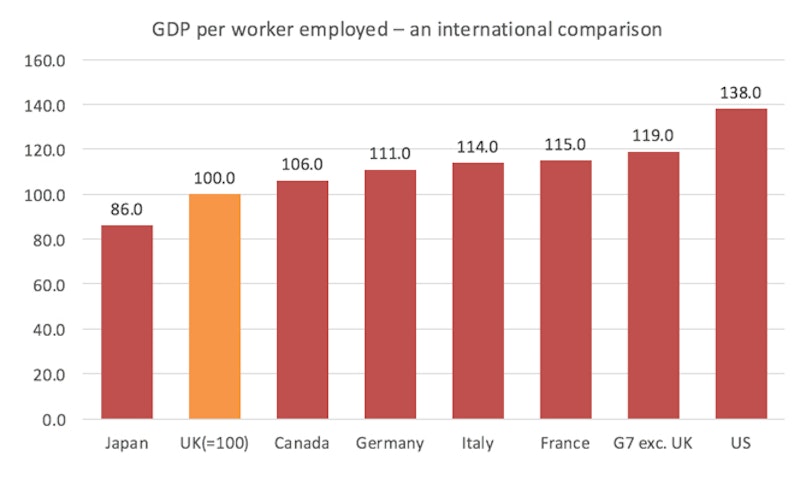Study Notes
The UK Productivity Gap
- Level:
- AS, A-Level, IB
- Board:
- AQA, Edexcel, OCR, IB, Eduqas, WJEC
Last updated 10 Feb 2019
The productivity gap is a term used to describe the fact that output per worker employed in the UK remains well below that of many of our major international competitor countries. Historically, UK labour productivity has grown by around 2% per year but since the 2008/2009 recession it has stagnated and the productivity gap has widened.
Labour productivity can be measured by GDP per hour worked and per worker, and growth in GDP per hour worked. This chart shows GDP per worker for G7 countries in 2015
Output per hour worked in the UK was 15.1% below the average for the rest of the G7 advanced economies in 2016; this compares with 15.5% in 2015. Output per worker in the UK was 15.4% below the average for the rest of the G7 in 2016.

Why does the UK economy lag on productivity?
Many reasons have been out forward most of them focusing in weaknesses in the supply-side of the economy.
- Low rate of new capital investment – many UK firms do not not operate at the cutting edge of new technologies
- Banking crisis affecting lending to businesses who want to expand
- Possible slowing rates of innovation – UK has low level of R&D spending (less than 2% of GDP annually)
- Persistent and deep skills shortages in key industries
- Relatively low levels of market competition – persistence of inefficient monopolies
- Low aggregate demand & high spare capacity – causing an under-utilisation of resources
Policy update:
In the 2016 Autumn Statement the Chancellor announced the creation of a National Productivity Investment Fund (NPIF). Over the course of the four years from 2017/18 to 2021/22, the Government has allocated £23 billion in spending for the new fund to be spread across four main areas: housing, transport, digital communications, and research and development (R&D). (Source: UK Parliament research papers)
New #stats show how #OECD countries perform in terms of #labour #productivity in 2017. See how your country compares 👉 https://t.co/VFhnlhBXhE pic.twitter.com/kgpnOTmYKg
— OECD Statistics (@OECD_Stat) February 4, 2019
You might also like
Perfect Competition - Economic Efficiency
Study Notes
Economic Efficiency Revision Quiz
Quizzes & Activities
Factor Immobility (Labour Markets)
Study Notes
Market Structures and Economic Efficiency
Topic Videos
Keynesian Aggregate Supply (MCQ Revision Question)
Topic Videos

How Competitive is the UK Economy?
6th December 2022
